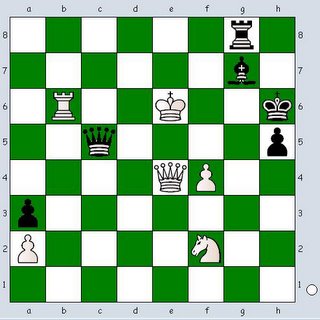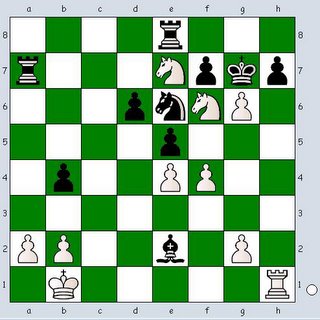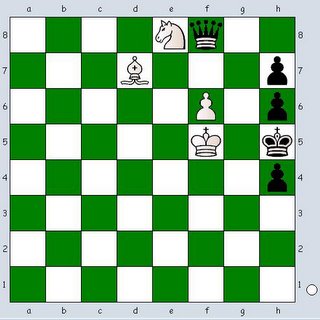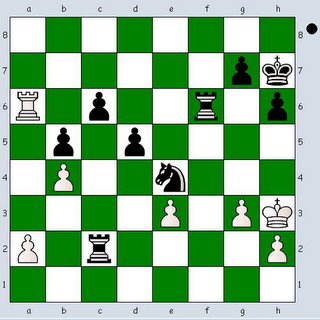Chess Terms
Chess Terms
Blocking – Usually refer to the King in Check. By placing a piece in the path of an enemy checking piece to stop it from reaching the King. But this method can be use for other piece as well.
Capturing – Taking an enemy piece and standing yours in its place.
Castling – A special King move involving a Rook (two moves are played as one).
Center – The four central squares – d4, d5, e4, e5.
Check – A move that attacks the King.
Checkmate – A check from which the King cannot escape.
Chessboard – A gameboard with alternating light and dark squares. It should always be placed with the white or light square in the near right-hand corner. Light on Right. The battle field for the chessman.
Diagonal – Corner to corner direction on the chessboard.
Discovered Attack – When a piece is moved that uncovers an attack by another piece on the enemy piece.
Discovered Check – This is a special form of Discovered Attack. When a piece is moved that uncovers an attack by another piece on the enemy King.
Draw – A result of a game in which neither side can win.
En passant – A French word means “in passing”. Immediately capturing a pawn that just advanced to place along-side.
Endgame –The final stage of a chess game after most of the pieces have been removed from the board. There are many study materials on the subject of Endgame. If one ought to play well in Chess then it requires special attention and studies.
Files – The rows going up and down the chessboard.
Forced move – When a player has no choice but to make that one move. (Options is not available.)
Fork – An attack by one man on two or more enemy pieces.
Middle game – The middle game typically starts when one part of the board is heavily contested by both players and a fight occurs. The fight will mostly move out into the center. Play in the middle game is dominated by attack and defense.
Move – White moves first, and then Black – Both constitute one chess move.
Open File – A file on which there are no pawns on both sides.
Opening – A term use for study to describe the development of forces from the original squares. It is completed when most pieces left the original squares, approximately the first 12 moves.
Passed Pawn – A pawn that is not challenge by an enemy pawn on its way down the file.
Pawn – A pawn is a pawn and they should not referred to as pieces.
Perpetual Check – When a King is put through a series of checks and cannot avoid and also it cannot be checkmated. This is a condition for Draw.
Piece – Any man except the pawn. The Queen and Rook are major pieces; The Knight and Bishop are minor pieces.
Pin – An attack on a piece which, if it should move, leaves a more valuable man open to capture. This is a tactical tool or weapon. There are three types of pin – Absolute Pin, Relative Pin and Invisible Pin.
Position – The arrangement of pieces on the chessboard.
Promotion – Getting a pawn through to the other side of the board where it can become a Queen, a Rook, a Bishop or a Knight.
Protecting – Same as Blocking.
Ranks – The rows running side to side across the chessboard.
Semi-open File – A file on which there are no pawn(s) on one side.
Smothered Mate – This mate can only be delivered by a Knight. When a King is surrounded by its own pieces and unable to move out of check from a Knight.
Touch move – A most important rule; If you touch a piece or pawn, you MUST move it.
Blocking – Usually refer to the King in Check. By placing a piece in the path of an enemy checking piece to stop it from reaching the King. But this method can be use for other piece as well.
Capturing – Taking an enemy piece and standing yours in its place.
Castling – A special King move involving a Rook (two moves are played as one).
Center – The four central squares – d4, d5, e4, e5.
Check – A move that attacks the King.
Checkmate – A check from which the King cannot escape.
Chessboard – A gameboard with alternating light and dark squares. It should always be placed with the white or light square in the near right-hand corner. Light on Right. The battle field for the chessman.
Diagonal – Corner to corner direction on the chessboard.
Discovered Attack – When a piece is moved that uncovers an attack by another piece on the enemy piece.
Discovered Check – This is a special form of Discovered Attack. When a piece is moved that uncovers an attack by another piece on the enemy King.
Draw – A result of a game in which neither side can win.
En passant – A French word means “in passing”. Immediately capturing a pawn that just advanced to place along-side.
Endgame –The final stage of a chess game after most of the pieces have been removed from the board. There are many study materials on the subject of Endgame. If one ought to play well in Chess then it requires special attention and studies.
Files – The rows going up and down the chessboard.
Forced move – When a player has no choice but to make that one move. (Options is not available.)
Fork – An attack by one man on two or more enemy pieces.
Middle game – The middle game typically starts when one part of the board is heavily contested by both players and a fight occurs. The fight will mostly move out into the center. Play in the middle game is dominated by attack and defense.
Move – White moves first, and then Black – Both constitute one chess move.
Open File – A file on which there are no pawns on both sides.
Opening – A term use for study to describe the development of forces from the original squares. It is completed when most pieces left the original squares, approximately the first 12 moves.
Passed Pawn – A pawn that is not challenge by an enemy pawn on its way down the file.
Pawn – A pawn is a pawn and they should not referred to as pieces.
Perpetual Check – When a King is put through a series of checks and cannot avoid and also it cannot be checkmated. This is a condition for Draw.
Piece – Any man except the pawn. The Queen and Rook are major pieces; The Knight and Bishop are minor pieces.
Pin – An attack on a piece which, if it should move, leaves a more valuable man open to capture. This is a tactical tool or weapon. There are three types of pin – Absolute Pin, Relative Pin and Invisible Pin.
Position – The arrangement of pieces on the chessboard.
Promotion – Getting a pawn through to the other side of the board where it can become a Queen, a Rook, a Bishop or a Knight.
Protecting – Same as Blocking.
Ranks – The rows running side to side across the chessboard.
Semi-open File – A file on which there are no pawn(s) on one side.
Smothered Mate – This mate can only be delivered by a Knight. When a King is surrounded by its own pieces and unable to move out of check from a Knight.
Touch move – A most important rule; If you touch a piece or pawn, you MUST move it.






